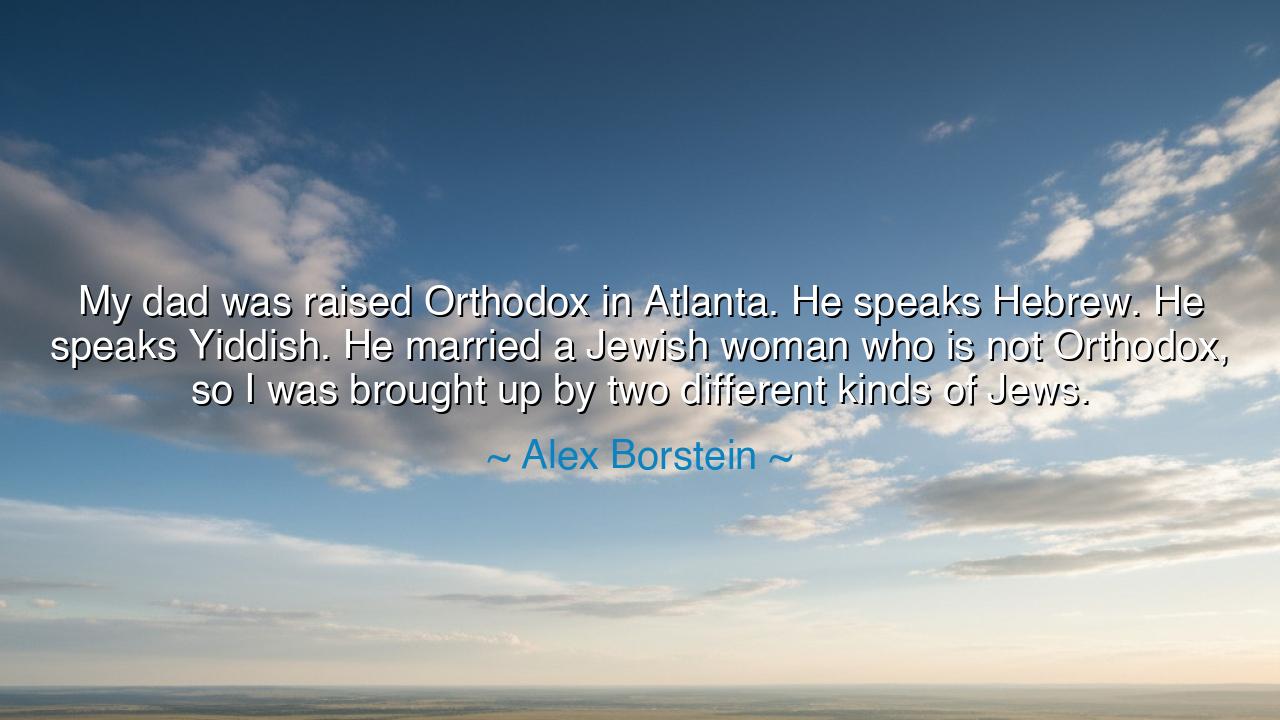
My dad was raised Orthodox in Atlanta. He speaks Hebrew. He
My dad was raised Orthodox in Atlanta. He speaks Hebrew. He speaks Yiddish. He married a Jewish woman who is not Orthodox, so I was brought up by two different kinds of Jews.






Hearken, O children of memory and inheritance, and listen well, for there is a wisdom in the weaving of souls across time: “My dad was raised Orthodox in Atlanta. He speaks Hebrew. He speaks Yiddish. He married a Jewish woman who is not Orthodox, so I was brought up by two different kinds of Jews.” Spoken by Alex Borstein, this reflection is not mere words; it is a testament to the complexity of identity, the fluidity of culture, and the living dialogue between tradition and the new. In these few lines, we glimpse the dance of heritage and adaptation, of the old ways meeting the new, and of the soul learning to hold both in balance.
In every age, there have been those caught between the strictures of the past and the freedoms of the present. The Orthodox father, rooted in Hebrew prayers and the songs of Yiddish, represents a lineage that stretches back through centuries of exile, wisdom, and devotion. He carries within him the weight of memory—the echoes of Torah study, the chants of synagogue, and the cadence of ancestors who survived through faith and resilience. Yet beside him stands another path: a woman of the Jewish people, vibrant and free, who does not walk the rigid road of Orthodoxy, but still breathes the essence of Jewishness in her daily life. In this union, the child—Alex—becomes a bridge, a vessel carrying the richness of dual heritage.
Consider the story of Anne Frank, a girl who bore witness to the devastation of her people while immersed in the everyday joys and struggles of family life. Though she was strictly raised in certain customs, her understanding of the world was expanded by the love, guidance, and perspectives of those around her who interpreted their faith and culture differently. In this mingling, there is a profound truth: the heart is strengthened not by uniformity, but by the encounter with multiple ways of being, by seeing the sacred expressed in many forms.
This quote also whispers a lesson about the tension and harmony between differing worlds. Orthodox Judaism carries strict rituals, prayers, and an unyielding discipline; non-Orthodox practice, while still Jewish, allows for a lighter, adaptive approach. To be nurtured by both is to inherit the wisdom of roots alongside the freedom of interpretation. It is to learn that identity is neither simple nor singular; it is a living conversation between past and present, between law and love, between discipline and creativity. The child who walks this path learns flexibility, empathy, and an appreciation for the multiplicity of life.
History, too, shows us that those who navigate multiple traditions often become voices of synthesis and vision. Consider Maimonides, the philosopher who bridged Jewish law, Greek philosophy, and Islamic scholarship. He drew strength from his own cultural inheritance while engaging with the world beyond, producing works that continue to guide generations. Like Alex Borstein, who grew up with two perspectives of her faith, Maimonides embodied the power of holding dual truths: that one can honor the sacred past while embracing new understanding.
From this reflection emerges a practical lesson for our own lives. We must recognize that our heritage—whether religious, cultural, or familial—is rarely singular or absolute. To grow wise, we must listen to multiple voices: those of tradition, those of innovation, and those of our own hearts. Just as Alex was nurtured by both Orthodox and non-Orthodox worlds, so too can we find strength in the intersections of difference, the meeting places of diverse thought, and the harmony born from contrast.
Thus, O seekers of wisdom, cherish your lineage not as a cage, but as a gift. Speak the languages of your ancestors, honor the customs that endure, yet remain open to the evolving expressions of your world. Learn the lessons of patience, of dialogue, and of respect for the paths others tread. In doing so, you craft an identity that is not fractured, but enriched, a life that honors both the old and the new.
In the final reckoning, we understand that duality is a blessing, not a burden. To be raised by two kinds of Jews is to inherit a richness of vision: the devotion to tradition and the courage to explore beyond it. Let this wisdom guide your heart—hold your roots deeply, but let your branches reach toward the sky. In embracing both, you become whole, and your life becomes a testament to the enduring power of heritage, love, and understanding.






AAdministratorAdministrator
Welcome, honored guests. Please leave a comment, we will respond soon